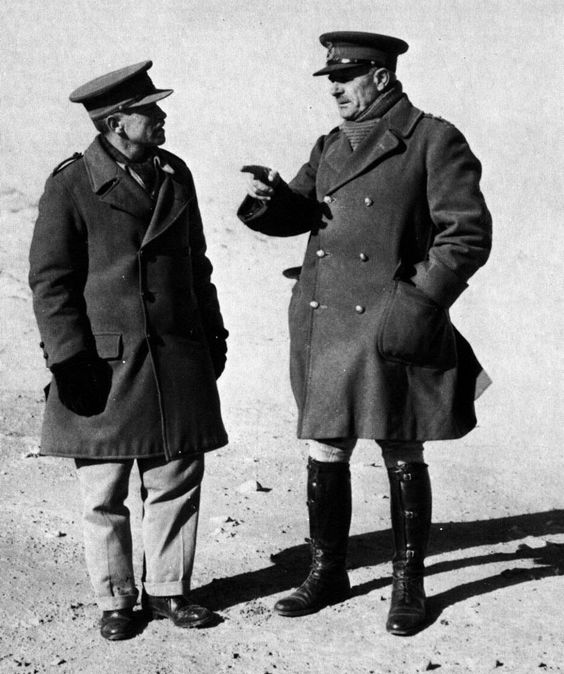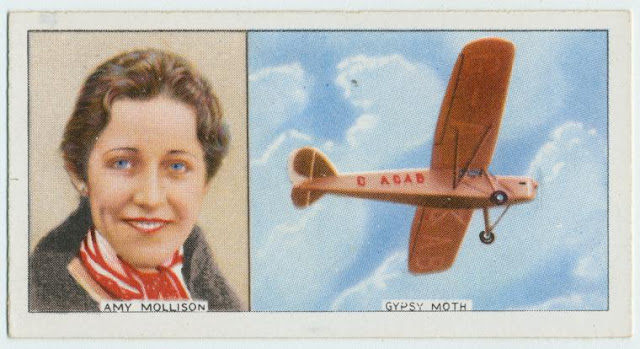Tuesday 14 January 1941
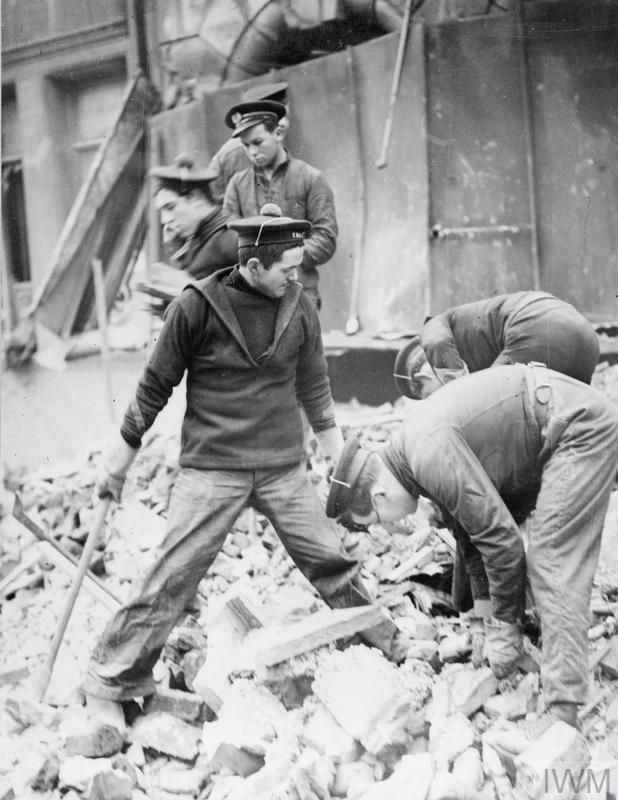 |
| "Free French sailors help salvage belongings and clear up amid the wreckage of a blitzed building in Portsmouth on 14 January 1941." © IWM (HU 55590). |
General Archibald Wavell, British Middle East Commander, is in Athens to visit with Greek Prime Minister Ioannis Metaxas and Commander-in-chief Papagos. The Greeks tell Wavell that they only have four divisions on the Bulgarian front (Yugoslavia is not on anyone's mind at this time) versus 13 in Albania. Already, the Greeks are heavily outnumbered by the German forces assembling in Romania and Bulgaria. Papagos and Metaxas request 9 British divisions for the defense of Greece, along with air support. Wavell hesitantly promises two or three divisions, though it would take time to transfer them. Papagos says that is not enough troops to make a difference and basically tells Wavell to not even bother then, since posting insufficient British troops would only invite a German invasion.
Mussolini, meanwhile, continues his visit to Albania to confer with his generals about stopping the Greeks. After it is over, he will head to Berchtesgaden to confer with Hitler.
European Air Operations: There is very little activity during the day or night. Electrical power is restored in Plymouth, bombed heavily in recent days, but gas remains off and will for some time.
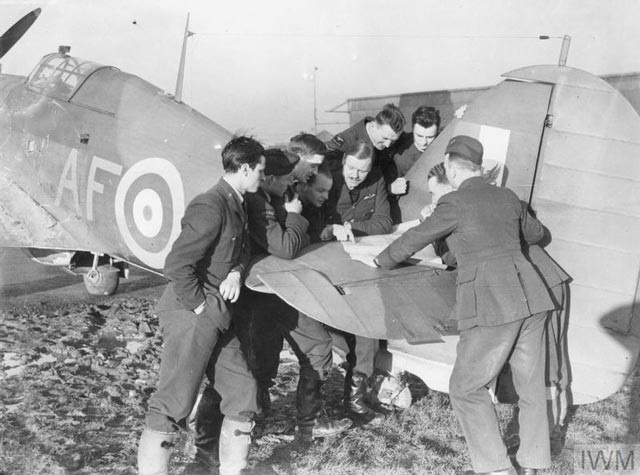 |
| "Polish pilots serving with No. 607 Squadron RAF studying maps on the back wing of a Hurricane as part of their training at RAF Usworth, 14 January 1941. One of the identified airmen is Pilot Officer Mirosław Orzechowski (fourth from the left)." © IWM (HU 92830). |
The whole event is over within 45 minutes without a shot fired or a single radio signal sent. Krüder tells the Norwegian crew that nothing, really, has changed; they should continue with their work, only, instead of the British paying them for their wares, the Reich will. Pinguin then sails off to find capture a factory ship nearby and associated vessels. All told, Pinguin rounds up 36,000 tons of shipping, 20,000 tons of whale oil, and 10,000 tons of fuel oil. The ships seized include:
- 12,201-ton oil refinery Ole Wegger
- 12,246-ton oil refinery Solglimt
- 298-ton whaling boat Pol VIII
- 354-ton whaling boat Pol IX
- 247-ton whaling boat Torlyn
- 297-ton whaling boat Globe VIII
- 338-ton whaling boat Pol VII
- 249-ton whaling boat Thorarinn
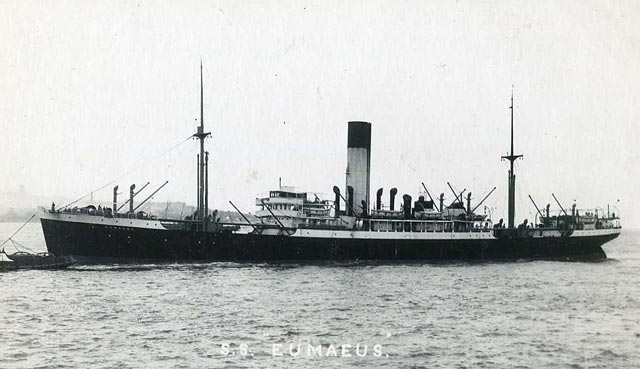 |
| Royal Navy auxiliary cruiser Eumaeus, sunk on 14 January 1941. |
German 280-ton pilot ship Borkum runs aground and is lost at Hubert Gat in the North Sea (near Emden).
Danish Emilie Mærsk runs aground and is lost off Borkum in the North Sea. The crew survives. This is one of a series of sinkings of Mærsk ships during the war.
 |
| Buitenzorg, lost on 14 January 1941. |
Royal Navy minesweeper HMS Fitzroy hits a mine and is damaged in the North Sea. It makes it back to Harwich, where it is beached, and then Sheerness for repairs.
Royal Navy cruiser HMS Adventure lays minefield ZME 15 in St. Georges Channel.
Convoy FN 383 departs from Southend, Convoy FN 384 is held back, Convoy AN 12 departs from Port Said for Piraeus, Convoy AS 11 departs from Piraeus.
Royal Navy submarine HMS Torbay (Lt. Commander Anthony Cecil C. Miers) and minesweeping trawler HMS MacBeth (Lt. Reginald M. Thorne) are commissioned.
Corvette HMS Jasmine and destroyer HMS Oribi are launched, while destroyer HMS Onslaught is laid down.
 |
| A British soldier and a Canadian sailor exchange pleasantries, 14 January 1941 (AP Photo). |
The RAF attacks Benghazi and Assab in Italian Eritrea.
German/Soviet Relations: The Soviet Union and Germany sign new trade agreements covering items such as grain.
German/Romanian Relations: Having met with King Boris of Bulgaria yesterday, Hitler today meets with Romanian Conducător Ion Antonescu in Berchtesgaden. Hitler backs Antonescu against the Iron Guard, which is fascist but unsupportive of Antonescu. Antonescu indicates that he would be supportive of Operation Barbarossa if he can eliminate the Iron Guard, which thus becomes a sort of quid pro quo, and together they discuss how to do that.
British Military: Sub-Lt John Bryan Peter Duppa-Miller and Stephen John Tuckwell receive George Crosses for disposing of a mine which fell into a stream feeding Barling Creek.
 |
| Danish steamship Emilie Maersk (German controlled), lost on 14 January 1941. |
Soviet Military: Army General, Chief of the General Staff and Deputy Commissar of Defense Kirill Meretskov - a Hero of the Soviet Union - is abruptly dismissed from his posts without explanation. Stalin later sees him at the Bolshoi, and, in front of others, has this to say to Meretskov:
You are courageous, capable, but without principles, spineless. You want to be nice, but you should have a plan instead and adhere to it strictly, despite the fact that someone or other is going to be resentful.Stalin will give Meretskov an object lesson on what it means to be "strict" in the Lubyanka after Operation Barbarossa starts. This is another step on a very tortuous and even torturous journey for Meretskov within the upper echelons of the Red Army. His career is by no means over, but Stalin will have his way with him before he restores Meretskov to any commands.
The disagreement appears to be personal (at least at this point), but Stalin has a reputation within the Red Army for acting ruthlessly toward his generals, dismissing them, practically killing them (and sometimes killing them) and then - when all seems lost for them - suddenly re-appointing the survivors to significant posts again. Without over-simplifying it or diminishing matters, Stalin's relationships with his generals at times resembles that of an abusive spouse. Firing them and even torturing them on very flimsy grounds is a challenging managerial technique - at least for subordinates - by which Stalin asserts his dominance and expresses his displeasure with certain characteristics of his generals.
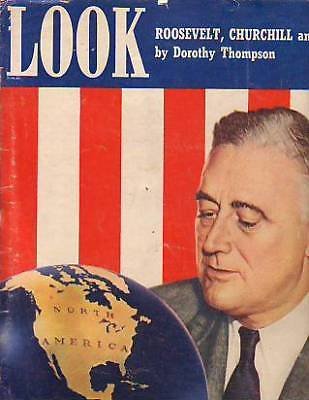 |
| Look Magazine, 14 January 1941. |
China: The Nationalist Chinese 3rd War Area completes the destruction of the encircled portions of the Chinese Communist New 4th Army near Maolin along the Yangtze River.
Holocaust: A deep frost has set in across Europe, which is particularly harmful to inmates at German concentration camps and ghettos such as those at Lodz and Auschwitz. Death tolls spike rapidly during chills due to insufficient food and heat.
German Homefront: With people spending more time in air raid shelters, Reich Propaganda Minister Joseph Goebbels proposes that conduct there be regulated. He requests that a list of "Ten Commandments of the Air Raid Shelter" be posted in every shelter.
British Homefront: Minister of Food Lord Woolton imposes price controls on 21 food items, including chicken, coffee, cocoa, honey, tinned food, meat paste, rice and pasta, pickles and sauces, jellies and custard, biscuits, nuts, and processed cheese. Speculators have been gouging customers, and chicken prices have risen 50% recently. All prices are pegged to those at the beginning of December 1940. Other price controls are expected.
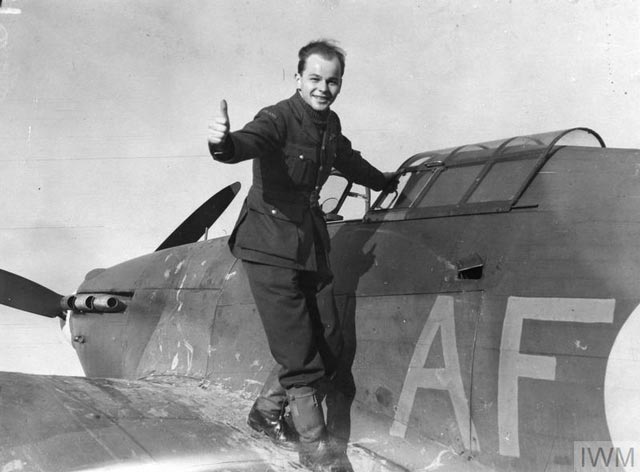 |
| "Pilot Officer Mirosław Orzechowski, one of the Polish pilots serving with No. 607 Squadron RAF, standing on a wing of a Hurricane at RAF Usworth, 14 January 1941. He was known as "Shrimp" on account of his diminutive stature and treated as the Squadron's mascot." © IWM (HU 128318). |
Meanwhile, in New York City shortly after noon, two brothers, Anthony and William Esposito, kill a man during a robbery near the Empire State Building and then lead police on a violent chase. During their attempted escape, the brothers also murder a police officer (Edward Maher) and wound a taxi driver (Leonard Weisberg). The Esposito case will become famous for its expansion of the insanity defense (it doesn't work for the Esposito brothers but will for many others in decades to come).
Future History: Dorothy Faye Dunaway is born in Bascom, Florida. She studies acting in college, then begins appearing on Broadway. This leads to film roles, such as Otto Preminger's "Hurry Sundown," for which she is nominated for a Golden Globe. She quickly snags prime acting roles based in part upon this success, including "Bonnie and Clyde," which leads to "The Thomas Crown Affair," and "Little Big Man." Faye Dunaway goes on to win numerous acting awards and remains active in the film business.
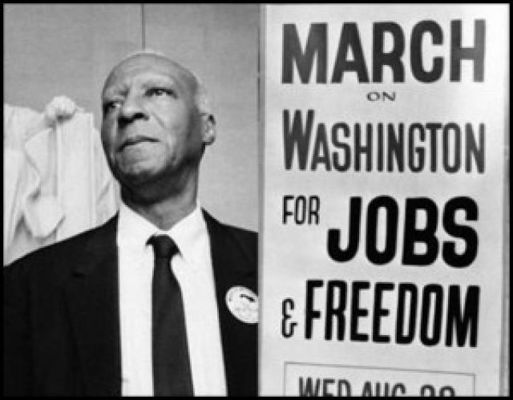 |
| Civil rights leader A. Philip Randolph proposes a march on Washington, D.C. to demand jobs in the defense industries for African Americans, which apparently is the first time this has been done. |
January 1941
January 1, 1941: Muselier ArrestedJanuary 2, 1941: Camp Categories
January 3, 1941: Liberty Ships
January 4, 1941: Aussies Take Bardia
January 5, 1941: Amy Johnson Perishes
January 6, 1941: Four Freedoms
January 7, 1941: Pearl Harbor Plans
January 8, 1941: Billions For Defense
January 9, 1941: Lancasters
January 10, 1941: Malta Convoy Devastation
January 11, 1941: Murzuk Raid
January 12, 1941: Operation Rhubarb
January 13, 1941: Plymouth Blitzed
January 14, 1941: V for Victory
January 15, 1941: Haile Selassie Returns
January 16, 1941: Illustrious Blitz
January 17, 1941: Koh Chang Battle
January 18, 1941: Luftwaffe Pounds Malta
January 19, 1941: East African Campaign Begins
January 20, 1941: Roosevelt 3rd Term
January 21, 1941: Attack on Tobruk
January 22, 1941: Tobruk Falls
January 23, 1941: Pogrom in Bucharest
January 24, 1941: Tank Battle in Libya
January 25, 1941: Panjiayu Tragedy
January 26, 1941: Churchill Working Hard
January 27, 1941: Grew's Warning
January 28, 1941: Ho Chi Minh Returns
January 29, 1941: US Military Parley With Great Britain
January 30, 1941: Derna Taken
January 31, 1941: LRDG Battered
2020

